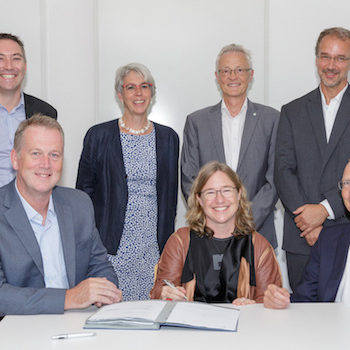Bayer and Forschungszentrum Juelich agree on research collaboration

Bayer and Forschungszentrum Juelich will enter into a 5 year collaboration
14 September 2016
Bayer and Forschungszentrum Juelich, a member of the Helmholtz Association, have entered into a five-year strategic research collaboration named Phenotyping for Products (P4P) to use novel, state-of-the-art root and shoot phenotyping to study the impact of traits, improved germplasm and biologicals on plant morphology and performance.
The insights gained in the collaboration are expected to help uncover how microbial seed treatments affect the root growth and architecture of relevant crops as well as how microbes colonize root systems. Major goals of the collaboration are the enhancement of root vigor by biologicals, traits or breeding for improved germplasm and the development of innovative solutions for plant health and yield improvement.
“Farmers worldwide urgently need new solutions to increase the quality and quantity of harvested produce. A profound understanding of factors which increase shoot and root vigor will enable the design of effective products which help achieve these goals,” said Dr. Adrian Percy, global head of Research and Development for Crop Science, a division of Bayer. He noted that crops are exposed to a wide range of both biotic and abiotic stresses, which often occur in combination and have a significant impact on yield stability. “This partnership between Bayer and Forschungszentrum Juelich will bring together leading scientists to leverage their combined knowledge for the elucidation of some of the most practically relevant secrets of root biology.”
“The crops of the future will have to deliver top performance,” said Raphael Dumain, global head of Crop Efficiency in Research and Development at Bayer. “And yield performance is linked to root functionality. We can breed for stronger root systems when we understand root phenotypes and the genes that control them but so far we have lacked the tools. In addition, certain microbes can modulate the root architecture and lead to improved water and nutrient uptake. Through this partnership we will gain more insight into plant-microbe symbiotic relationships.”
“This strategic collaboration highlights the leading role of the Institute of Bio- and Geosciences (IBG): Plant Sciences in the field of root and shoot architecture phenotyping. It underlines the high recognition of the biological work done at IBG: Plant Sciences for the development of innovative solutions to increase agricultural productivity. This collaboration will be highly beneficial to translate the technological advancements in plant phenotyping into practical applications. Together with our partner Bayer we will thereby address food security and resource stewardship in the context of global agriculture,” said Professor Harald Bolt, member of the board of directors at Forschungszentrum Juelich.
“In this collaboration, we will apply our expertise in root physiology and biological interactions in the soil together with state-of-the-art phenotyping technologies. This will provide new insights and application options for utilizing biologicals to improve water and nutrient use efficiency,” said Professor Michelle Watt, Director of IBG-2: Plant Sciences.
“Forschungszentrum Juelich is a world leader in analyzing root and shoot growth with innovative non-invasive technologies. This partnership will employ these technologies to enhance root and shoot vigor,” said Professor Ulrich Schurr, Director of IBG-2: Plant Sciences.



 Print
Print









Fans 0
Followers